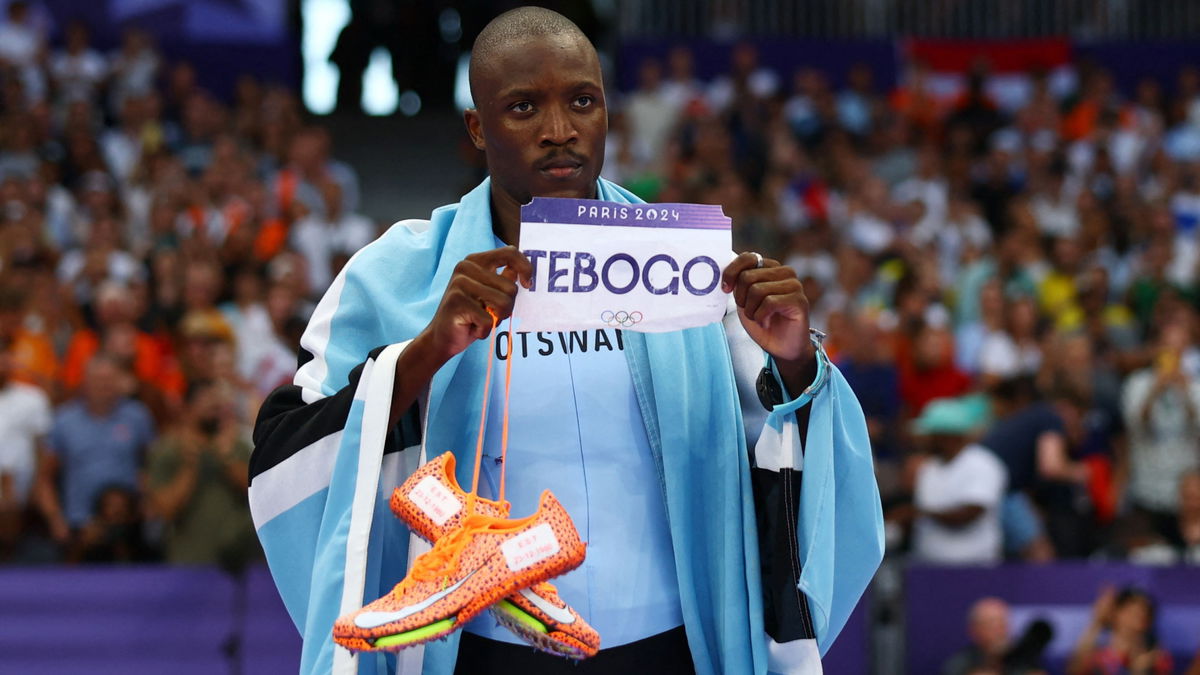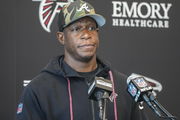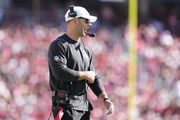

Letsile Tebogo could not live up to the hype around him in the 100m race in Paris. In the closest 100m Olympic final in history, he only managed a sixth-place finish on August 4. Four days later, he only had one more chance to make not only his continent proud but also the woman who could have been “the happiest person on the planet” looking at Tebogo’s triumph. In the 200m finals on August 8, he did not squander the opportunity.
Watch What’s Trending Now!
Blowing away the intimidation of two American Olympic medalists (Noah Lyles and Kenny Bednarek), Tebogo took 19.46 seconds to bring Africa its first 200m title from the highest sporting spectacle while also giving his country the first Olympic gold. But probably nothing could beat Tebogo’s emotion for Elizabeth Seratiwa, his late mother, whom he lost in May. “She’s watching up there, and she’s really, really happy,” he told after the race. And an American track and field legend could feel this wholesome moment Tebogo had.
In an August 15 episode of the ‘Ready Set Go’ podcast on YouTube, Justin Gatlin and Rodney Green discussed Letsile Tebogo’s remarkable Paris Olympics performance. Gatlin felt deeply moved by Tebogo’s achievement, especially considering the recent loss of his mother. He reflected, “When he finished that race and posted a phenomenal time of 19.46 [fifth fastest ever], he showed the world that he was running for his mother.” Gatlin then talked about the most emotional side of his journey.
ADVERTISEMENT
He continued, “After the race, he took off his spike, held it up to the camera, and revealed that the time was dedicated to her birthday. He did it for her.” The spikes that Tebogo wore at the 200m final bore the date “23-12-1980″—the birth date of his mother. “It’s basically me carrying her through every stride that I take. Me, to take her, it gives me a lot of motivation,” Tebogo said about it after the race. But do you know why he put the date of birth and not the death?

ADVERTISEMENT
As Tebogo explained, “I didn’t want to put the date of her death, because I’ll get emotional.” Indeed, the death unsettled him to the core. For nearly a month, he barely had the mindset to pursue anything, unable to come to terms with the fact that his mother was not there. “For me, I have to find the reason why I started my athletics journey and why I should continue going on,” Tebogo recalled. Gatlin believes this strong emotional factor is something that kept Tebogo ahead of his peers.
ADVERTISEMENT
“How do you stop somebody from running as fast as they can humanly run because they’re not running for themselves they’re running for someone that you can’t even describe how much they love?” Gatlin said. However, beyond this, Gatlin also spared a thought for Tebogo’s buildup for the Paris Olympics this year.
“I don’t think Noah would have beaten him, you know what I mean? I have to say, what an amazing year it has been for Tebogo. To start the season with an incredible 300, a remarkable 400, and a world-leading 200, and then to hear the heartbreaking news of his mother’s passing—it’s something many of us can never truly understand.” Gatlin said. We can not agree more looking at Tebogo’s extraordinary year.
On February 17, Tebogo established his dominance by running the fastest-ever 300m in South Africa. It took him 30.69 seconds to finish the race at the Simbine Curro Classic Shoot-Out in Pretoria. On that occasion, he broke the record set by South Africa’s celebrated sprinter Wayde van Niekerk (30.81) in Ostrava in 2017. He then reiterated that with a run of 44.29 in 400m at the Asa athletic Grand Prix 2 that put him in the 7th position on the world-lead list before the Olympics. But probably the biggest message came weeks before the Olympics.
ADVERTISEMENT
At the Monaco Diamond League in July, Tebogo blazed to victory with 19.87s. But despite rising to the top, unlike Noah, Tebogo claimed that he was not in the run to chase any world record, read Usain Bolt. After the Olympic win, Tebogo was asked if his breakthrough performance put him in the race to break Bolt’s record. In a pretty bold statement, he had said, “I can’t be the face of athletics as I’m not a loud or arrogant person like Noah.” But as Gatlin pointed out, his countrymen left no stone unturned to let the world know about its achievements.
“I would love to see the videos that they always do when an individual from their country wins, especially from a smaller country,” Gatlin said. Indeed, Tebogo who was also a part of the silver-winning relay team, received a hero’s welcome in the country. As they returned home on Tuesday, August 14, thousands of fans greeted them at the airport with a water salute as their plane landed. Traditional dancers wearing animal skins and beads were at Sir Seretse Khama International Airport to mark the occasion.
The athletes celebrated their historic Olympic achievements with a parade on an open-top bus through the capital city. The team also met with President Mokgweetsi Masisi, who declared a half-day public holiday in honor of their achievements. He even danced to delve into the joy. Over 30,000 fans turned out to celebrate the Olympic team’s success at Botswana’s national stadium. Some more tangible rewards also followed.
ADVERTISEMENT
The sports minister announced that Tebogo would receive two houses from the government. The other members of the relay team would receive one house each. However, amid all this, Tebogo did not forget his motherland and pointed out what his win meant for Africa.
Long-distance powerhouse Africa making waves in short-distance sprinting
“This medal isn’t for me, it’s for Botswana, for Africa. Because Africa has been short of medals in men’s sprints,” Tebogo said, summing up the significance of his win. Truly, his win adds one more page to the surging influence of Africa, a continent typically known as a powerhouse in long-distance running. The sprinter who started it all was Namibia’s Frankie Fredericks, often dubbed as the father of African sprinting.
ADVERTISEMENT
Fredericks asserted his dominance by winning back-to-back 100-200m double silver medals at the 1992 Barcelone and 1996 Atlanta Olympics. Carrying his legacy forward was South Africa’s Wayde van Niekerk. He clinched consecutive 400m world titles in 2015 and 2017 while also securing world silver in 200m. But Niekerk’s pinnacle point came in the Rio Olympics in 2016.
He set a world record of 43.03 seconds to become only the second African athlete to win the Olympic 400m, almost 100 years after Bevil Rudd’s gold at the 1920 Olympic Games. Now, probably the only target for Africa remains the 100m. The continent’s last title in the event came in 1908 games when South Africa’s Reggie Walker clinched it. But The shoer-distance sprinters have been creating opportunities consistently.
Top Stories
Falcons Owner Arthur Blank Makes Double Firing Decision as Locker Room Stands Against Raheem Morris’ Exit

Cowboys Star Faces NFL Discipline For Jaxson Dart Incident Against Giants

49ers’ Deommodore Lenoir Goes on Expletive-Laced Rant Against Troy Aikman After Criticism From Cowboys Legend

Kirk Cousins Announces Return Stance With Falcons After Atlanta’s Four-Game Win Streak

Nine NFL Coaches Who Could Receive Black Friday Pink Slips: Predictions on Pete Carroll, Todd Bowles, Matt LaFleur & More

LSU’s Second Straight Loss Forces Kim Mulkey To Admit a Hard Truth

Take the example of South Africa’s Akani Simbine. He has reached the Olympic 100m final at three consecutive Games: Rio 2016, Tokyo 2020, and Paris 2024. On each occasion, he missed the podium by a few thousandths of a second. One more notable sprinter amid this budding crowd is Kenyan Ferdinand Omanyala. His continental record of 9.77s, clocked in 2021, lands him as the ninth fastest man all-time. Indeed, Tebogo’s success meant a lot to Africa.
ADVERTISEMENT
“Now they see Africa as a sprinting home. So we just had to make sure that the message is loud and clear. It didn’t take so long, they were just waiting for me to step up,” Tebogo noted after the race. Back in 2001, a Jamaican multiple Olympic medalist had invested the same belief in Africa’s success in sprinting.
“We in the Caribbean share the same genetic makeup as people in Africa. Therefore, there is no reason why Africans cannot be among the best sprinters in the world,” Merlene Ottey, 3x world champion, had said. Then what stops the continent from bursting into the scene with equal dominance like the USA or Jamaica? Trinidad and Tobago’s Olympic 100m silver medallist Ato Boldon has the answer.
According to Boldon, the sprinters from the continent do not do as well because they lack the technical expertise required to produce world-class athletes. “Jamaica has put such a system in place and since the 1960’s has produced a steady stream of quality athletes. Their system is a good model for many developing countries in Africa,” Boldon had said in 2001. Hopefully, Tebogo’s fresh success will make the continent revamp its facilities to breed more champions like him.
ADVERTISEMENT
ADVERTISEMENT
ADVERTISEMENT
ADVERTISEMENT

